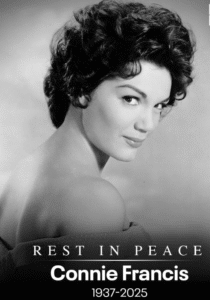Pop legend Connie Francis, famed for her 1962 song “Pretty Little Baby,” passed away on July 16, 2025, at the age of 87. Her death was confirmed the following day by her close friend and longtime manager, Ron Roberts, via a heartfelt post on Facebook. He described his “heavy heart and extreme sadness” and emphasized that Connie would have wanted her fans to learn of the news first.
In recent weeks, Francis had been battling severe pelvic pain that led to hospitalization. She was admitted to intensive care on July 2 after enduring “extreme pain” and became reliant on a wheelchair due to a fractured hip. Despite an initial recovery—she even thanked fans in a July 4 post—the pain persisted. She remained hospitalized in Florida, received tests and care but, tragically, never fully recovered before falling unconscious for at least two days prior to her death People.com+3Wikipedia+3The Sun+3.
Part of what brought Francis renewed global attention in 2025 was the viral resurgence of her B‑side recording, “Pretty Little Baby.” Originally recorded in 1961 and released in 1962, the track exploded on TikTok, featuring in millions of videos and accumulating billions of views. It soared to the top ranks in Spotify’s global viral charts and has streamed tens of millions of times—over 27 billion collective TikTok views and significant placements in Spotify, where some reports cite over 74 million streams ABC News+6The Sun+6EW.com+6. Connie herself was astonished, saying, “To think that a song I recorded 63 years ago is touching the hearts of millions… is truly awesome.” She admitted she’d even forgotten the song until hearing it again ABC News+3The Sun+3The Guardian+3.
Born as Concetta Rosa Maria Franconero on December 12, 1937, in Newark, New Jersey, Francis won her first talent show at age four and began performing professionally soon after. Adopting the stage name Connie Francis, she signed with MGM in 1955. After a series of early flops, her father encouraged her to record “Who’s Sorry Now?”—a gamble that paid off when she performed it on American Bandstand in 1958. It became a hit on both sides of the Atlantic, catapulting her into international stardom EW.com+6The Guardian+6People.com+6.
Between the late 1950s and early 1960s, Francis dominated the music charts with a string of hits: “Stupid Cupid,” “Lipstick on Your Collar,” “Everybody’s Somebody’s Fool” (the first solo female No. 1 on the Billboard Hot 100), “My Heart Has a Mind of Its Own,” “Don’t Break the Heart That Loves You,” “Where the Boys Are,” and more. She recorded songs in multiple languages—Italian, Spanish, German, Swedish, Japanese—earning her a broad international appeal VG+6People.com+6The Guardian+6. Her success extended into acting, with film roles in Where the Boys Are (1960) and Follow the Boys (1963), and recognition from the Golden Globes in 1964 for her contributions to recording EW.com+1The Guardian+1.
Yet, Francis’s life was marked by profound personal challenges. In 1974, she was brutally raped at knifepoint in a Long Island hotel—an assault that plunged her into a devastating period of withdrawal and depression New York Post+4The Guardian+4The Sun+4. In 1977, she suffered temporary loss of her voice following nasal surgery. In 1981, her brother George was tragically murdered by Mafia hitmen. The aftermath of these traumas worsened her mental health: she was misdiagnosed with bipolar disorder, hospitalized multiple times in psychiatric facilities, and attempted suicide in 1984, surviving a coma. She reflected later, “I was misdiagnosed as bipolar, ADD… a few other letters that the scientific community had never heard of,” ultimately concluding she suffered from post‑traumatic stress disorder People.com+1New York Post+1.
Despite these hardships, Francis demonstrated immense resilience. Her 1984 autobiography, Who’s Sorry Now?, became a New York Times bestseller and bravely addressed her personal struggles. She also channeled her experiences into advocacy, working with groups supporting sexual assault victims and serving on a violent crime task force during President Reagan’s administration. In 2010, she partnered with Mental Health America to raise awareness about the long-term effects of trauma The Guardian+4People.com+4New York Post+4.
Although she stepped away from the music industry in 2018, Francis returned to the public eye briefly in 2024 and 2025—first through the unanticipated viral revival of “Pretty Little Baby,” and again with plans to perform at a July event hosted by radio personality Cousin Brucie. Sadly, her health prevented her from attending The Guardian+9Wikipedia+9The Sun+9.
On the personal front, she married four times: first to Dick Kanellis (1964), then Izzy Marion (1971), followed by Joseph Garzilli (1973; they adopted her son, Joseph Jr., in 1974), and finally Bob Parkinson (1985)—each union lasting only months, except her third marriage, which ended in 1977 The Guardian+2People.com+2New York Post+2. She is survived by her son, Joseph Garzilli Jr., and her enduring legacy as a musical pioneer.
Legacy and response:
-
Industry voices and fans worldwide are mourning her loss, reflecting on her incredible achievements and perseverance .
-
Her contribution to music—including being the first solo female artist to top the Hot 100—paved the way for generations of women in pop music Wikipedia.
-
Through her advocacy and candid openness about trauma, she helped destigmatize mental health and gave voice to survivors.
-
The astonishing viral resurgence of her 1962 recording, over six decades old, reaffirmed the timeless nature of her artistry and introduced her to a new, diverse audience across social media platforms .



